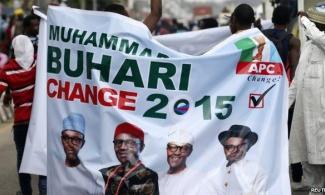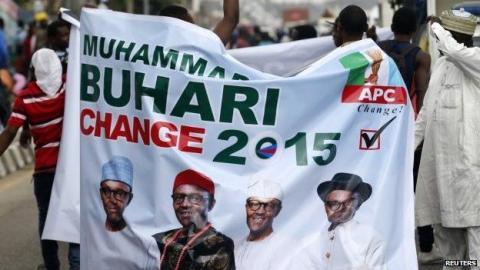
There is a lot of public discussion around what has changed since President Muhammadu Buhari’s administration assumed office.
There is a lot of public discussion around what has changed since President Muhammadu Buhari’s administration assumed office. In the media and on the streets the debate continues. When during the acute fuel scarcity recently attendants at a petrol station refused to sell fuel into jerrycans, a customer who had been waiting for a long time exploded in frustration, “This na change, hey? No light, no fuel for generators.” Another customer rejoined, mockingly, “Na change be dat.” A third customer said, “I voted for change but not like dis.”
It is frequent to read and hear that nothing has changed, or that the country is worse off now than it was in the past. Given the hardship all around on many fronts, it is not difficult to understand the anxiety and frustration. If one does not have electricity for days, weeks; and fuel to run generators is not available, if fuel is very expensive when available; if stories of kidnap for ransom are frequent; if the news is often that cattle herders kill people wantonly; if many employees of stategovernments are not paid, and university graduates have no jobs, and prices of foods, consumables, rent…keep increasing, there is a lot to be unhappy about.

Yet one should strive to have a sense of balance. Especially in written discourse, there ought to be deeper reflection and analysis, no matter how easy it may seem to lean on negative generalities. There are serious changes that are taking place in the country, and for good, despite the numerous problems facing the populace at present. Many of the difficulties being witnessed are attributable to years of bad governments, misrule, abuse of office and corruption. Some of the hardship are pains that accompany reversal of official misdeeds and mis-management of the country. And, yes, some of the hardship are due to inadequate grasp of implications and effects of policy changes by the new (relatively) government and slowness in making corrections.
Lest we have forgotten, I recall the following two articles that I wrote last year. In one, during the political campaigns, first published by Sahara Reporters on January 13, 2015, titled, “Buhari: Beyond 2015 Elections- An End to Corrubration,” I wrote:“People who fraudulently acquire enormous wealth or assets after serving in government for even a short time are welcomed with drums and dance in their communities. Military officers who earn limited salaries and allowances somehow can afford to pay for three to five students at the most expensive universities in the UK or USA, and can pay all the students’ expenses for one year at once, including for accommodation and feeding. Civil servants use their offices and authority illegally and own rows of houses in Abuja and Lagos in the most expensive places. Celebration and conspicuous display of extraordinary wealth in billions of naira is common and done with impunity even by people who cannot explain how they made a million naira. ‘Corrubration’, or celebration of corruption, has become a national norm.”
In a second article titled, “Buhari And Roots of Corruption”,also first published by Sahara Reporters on July 21, 2015, I wrote: “The new government is acting decisively and visibly and strongly on two major planks of the campaign promises – stopping Boko Haram insurgency and fighting corruption. This article is about how to expand and win the fight against corruption, on the long run. Unless corruption is put at bay, even the efforts against Boko Haram will be inconsequential. President Buhari, with the best of intentions, cannot and should not fight a “lone” battle against corruption, nor should he aim only at short term goals within his mandated period in office. Corruption has become endemic and both its roots and trunks must be removed. His ongoing actions at the trunks should go further to the roots.”
I cite these articles to redirect our minds to the times we lived in preceding elections in 2015. My citations reflected the mood of many citizens. The disillusion and disenchantment with the previous government was borne out by results of the elections when voters dismissed the Jonathan government and welcomed overwhelmingly the Buhari administration.
Since the assumption of office by the Alliance of Progressives Congress (APC), the fight against corruption has been openly and soundly prioritized. Daily for the past months, the media of all types is replete with incredible revelations of official stealing, thieving, financial and material disrobement of country, conniving and unexplainable acquisition of monies by so-called leaders and officials in whom the nation entrusted authority and responsibility. No Nollywood script writer could have come up with a storyline that truly portrayed the extent of corruption that we hear and read about, thanks to President Buhari’s leadership. Corruption did not start with the Jonathan administration, but from what we know today, massive, unlimited corruption was aprime activity of that government.
The naming, trial and, hopefully, jailing of the big wigs that are subjects of today’s accusations and trials on corruption cannot lead to an end to corruption, yet it is a fundamental step in the cleansing. The recovery of stolen monies from these animals-in-human-skin, as chanted by Fela Anikulapo-Kuti, is also crucial. Other measures should be used too, such as permanent shaming of guilty persons. Looters of the nation, no matter how highly placed, should not benefit from the loot. It can no longer be the case that election into political offices, and appointments to government positions is seen as the highway to corrupt enrichment. At this time, there is already more care on illegal financial acquisition, more soberness and less unbridled acquisition of wealth through corrupt means than was the case. People can and will change, and the ongoing pressure on corruption is a key step towards change. Even those whose main focus in government and with government was to steal cannot be so carefree and open about it today as they did in the past. There are consequences. The celebration of corruption is no longer in fashion.
Despite what is being done, government appears to be tackling the first phase of its anti-corruption strategy. Other phases – mass education, re-orientation, structural refinement of judiciary and law and order institutions – should start and be done seriously during the life of this government.
Last year, Boko Haram’s rampaging menace was a glaringreality, and was almost accepted as unstoppable. Boko Haramoverran states in the North-eastern part of Nigeria. Nigerian military absconded, abandoned posts and barracks, escaping from advances of Boko Haram. The insurgents killed almost at will, abducted and chased people away from villages and towns. When some victory was recorded against Boko Haram just before the elections, the international media explained it as a good job done by forces from neighbouring Chad and hired mercenaries from South Africa. Abuja was under threat as the terrorists struck it repeatedly. The fear of possible Boko Haram’sactions in Lagos became so real that the then Governor Fashola’s government had to reassure the public that it would not happen. Not many people accepted the reassurance though. There were friends and well-placed Nigerians who started to seek alternative residence outside of the country.
Today, the situation is different. In Abuja and Lagos, the fear of Boko Haram is no longer part of conversations. In the North-east, once a home turf of Boko Haram the main activities are to relocate displaced people to their homes, reestablish livelihood for people who have been turned into refugees, find abducted people including the Chibok girls, and make Boko Haramdisappear altogether from Sambisa Forest. The glaring successful frontal attack against Boko Haram has been led by the same Nigerian military that was almost totally discredited and labeled as fatally demoralized. Today, the insurgency is contained. If this is not change, then what is it?
There is a long way to go to create a vibrant, secure and economically strong Nigeria. But noises that say no change has taken place are wrong. On corruption and on security in relation to Boko Haram, change is happening under our eyes. More change is needed overall, especially to develop infrastructures, create employment, improve the quality of life and improve power supply which is the root of growth.
Bunmi Makinwa is the CEO of AUNIQUEI Communication for Leadership. Formerly, he was Africa Regional Director of United Nations Population Fund (UNFPA)